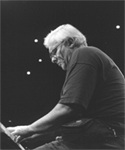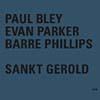
A
FIRESIDE CHAT WITH PAUL BLEY
History is hardly kind to honorable men. Thinking about the sheer number
of examples would only serve to make me frustrated. Paul Bley has always
held onto his art. The pianist has been perceived as a loner because of
his individuality. And that is a black-eye for the writers of this music,
whom have conveniently pigeonholed what they may not understand. But no
one wants to look like a fool, so here is a lesson from Bley on Bley,
unedited and in his own words.
FRED
JUNG: Let's start from the beginning.
PAUL BLEY: I'm from Montreal originally. I grew up with Oscar Peterson
and Maynard Ferguson. Being a piano student at the time, I attended all
their performances. When Oscar left to go to with Norman Granz's Jazz
at the Philharmonic, he asked me to replace him at the Alberta Lounge
in Montreal for a year, which was my final year in high school. After
a time, I went to New York and went to Juilliard and started making recordings
of which there are now a hundred and twenty.
FJ: You were so young when you played with Charlie Parker, how challenging
was it for you to play alongside one of the most charismatic enigmas of
the music?
PAUL BLEY: Well, we ran an organization up there called the Jazz Workshop,
which was a musician's collective. We collectively performed together,
twelve or fifteen bands and took the profits and used it to import American
musicians. They sent me down to find Charlie Parker and to bring him back
to Montreal. I had heard that he lived in a basement on 72nd Street in
Manhattan with this saxophone player, Joe Maini. I went to visit him there
and the story I tell is that I knocked on the basement door and asked
to speak to Bird and Bird came to the door and I invited him to play the
concert. He was very much of a, he reminded me of my dad, a short man
with a deep voice and very, very nice guy. I was told that I had to watch
him carefully because he tended to wander off and I did. But musically,
he was a revelation. It was necessary to leave home and go to New York
and give up my family and friends because playing with him was so informative
that I realized that I could no longer live in Montreal and I'd have to
go to New York. My ambition was to work with Bird, which came to fruition
about four years later.
FJ: Charles Mingus was an enthusiastic advocate of your playing and was
instrumental in the culmination of your debut record, Introducing Paul
Bley.
PAUL BLEY: When I went to New York, I was a member of the New Jazz Society,
an organization of jazz fans as opposed to the Montreal organization of
musicians. At the meetings, Mingus played and I got to meet him. I was
just a Juilliard student conducting composition and so forth and he was
experiencing problems realizing some of the small band work and would
I help him conduct and orchestrate some of his pieces and I said I would
be happy to. So he formed a record company, Debut Records and when I went
back to Montreal for a visit, he called me up there and invited me to
come to New York and conduct a piece, conduct an album called Weird Nightmares
, a piece on an album of weird nightmares and to make a trio record with
Art Blakey, which for me is, I think it had to have been 1951, was a very
big opportunity for a teenager. I was nineteen at the time. I realized
right away, I had a lot of professional experience playing in Montreal,
but one thing one has to realize is that when you get in professionally,
you have to ascertain what the problem is going to be and in the case
of Art Blakey, the problem was volume because he was the world's loudest
drummer at the time. So I divided this routine of looking like I was playing,
but not playing and he had to play soft. He would play softer and softer,
trying to find the piano in the mix. That was helpful because he did manage
to play quiet enough so that we could play together. Problem solving has
been my forte ever since then. That's pretty much what you have to do
when you play is to look at the individuals personally and to find out
what the worst case scenario is and go with that.
FJ: Ornette Coleman, Sonny Rollins, Jimmy Giuffre, Charlie Haden, Paul
Motian, Gary Peacock, Don Cherry, Mingus, Blakey, Bird, Evan Parker, Jaco
Pastorius, Pat Metheny, Jacki McLean, that's just a short list of the
many pivotal figures you have played with. Are there any musicians you
would like to play with, but you have not yet had the opportunity to do
so?
PAUL BLEY: Well, there are a lot of downtown musicians, downtown New York
musicians, who I'm looking forward to recording with. People like Dave
Douglas, John Zorn, and so forth. These are people in the last decade
and I'm looking forward to recording with them.
FJ: As a composer who has worked with some of the most progressive composers
in the music, what is the essence that a composition must have to reach
an audience?
PAUL
BLEY: Well, the compositional aspect is an interesting one, Fred. In fact,
so much of the music is improvised that the line between improvisation
and composition pretty much disappear, so that the goal in improvising
is to sound like it is composed. From the audience's point of view, they
are not really supposed to know whether it's written or improvised, so
what you're really talking about is spontaneous composition, which is
often called improvisation. The audience responds not so much to composition
or improvisation, they respond to the individual players and what they
respond to with the player is pretty much the timbre and tone of the player
and the passion of a player. That's what engages an audience. The content
of the music, the harmony, the rhythm, those are secondary, actually,
to world-class performers. They mostly respond to the sound of the players
and the fact that the player's style is recognizable to them because of
recordings.
FJ: There is one recording in particular that is a personal favorite of
mine, Bebopbebopbebopbebop on Steeplechase.
PAUL BLEY: I'm very happy with that record. Actually, I've been happy
with all the records post 1960. Prior to that, I'm unhappy with all the
records. The premise of that record was to use the bebop classics as a
platform to play with chord changes and use the bebop format, but also
to bring in the new ideas of free jazz on top of a popular song based
chord changes. I bridged those periods, the bebop period with the free
music period and they inform each other.
FJ:
You alluded to the fact that you are unhappy with anything pre-1960, is
that because it was early in your development?
PAUL BLEY: Well, I was not a fully formed player as Oscar or Maynard was
in the '50s. For me, it was a question of acquiring skills, different
skills each decade, synthesizer skills in the '70s, free music skills
in the '60s to add to the bebop skills if the early '50s, so once the
music, once we got to 1960 and I had been introduced to Don Cherry and
Ornette Coleman, they were so flexible rhythmically, that it was easy
to add enough variety to play, so that it would be of interest to a wide
group of audiences.
FJ: I spoke with Gary Peacock a few months back and he credited you with
changing the way he hears music. Does the way in which you hear music
allow for more flexibility in your improvisations?
PAUL BLEY: Well, there are only twelve different notes. Eleven of those
notes sound good together, so you only have to worry about one (laughing).
We're a hundred years past the crest of classical music and I think the
audience and the musicians are ready to combine any set of notes that
are attractive to them, without worrying about whether or not this distorts
the harmony.
FJ: Let's talk about your new release on ECM with Gary Peacock and Paul
Motian, Not Two, Not One.
PAUL BLEY: That album's called Not Two, Not One and it's with Paul Motian
and Gary. We had played together, not necessarily as a trio, but we had
played together in different combinations in the '60s. The philosophy
behind that album is that it is not absolutely necessary to relate to
each other when you play. You can have three parallel voices. That's one
possibility, also the idea of counterpoint. If you're, once again, twelve
notes and eleven work, counterpoint is really not so much whether you're
playing together, as to whether your own playing is imaginative enough
to hold the listener's ear. So there's competition between the three players
for attention, as opposed to imitating one voice or another. Another thing
in that album, I had been working on solo piano styles, trying to face
the question of what's the prerequisite to playing solo piano in free
music. There was a number of styles offered and for me, I hadn't really
decided on what style would work best for me after the early ECM album,
Open To, Love. So this album explores some other solutions to the questions
raised by solo piano.
FJ: One of the obstacles musicians playing what is commonly referred to
as free jazz is that they are often maligned for their lack of formality.
PAUL BLEY: Well, in all the arts, painting, poetry, literature, and so
forth, what the purist of the avant-garde and the near view turns out
in retrospect to not be the thing that is the most of concern. The real
thing that happens over time is whether the work has interest or substance.
Art always has survived one decade later, one continent removed.
FJ: And the future?
PAUL BLEY: Well, there's this new hi-fidelity recordings that are made
by Sony and I was in Tokyo recently and made a duo album there, piano
and drums. And that just came out. There's also a new book that came out,
coincidentally, this week called Stopping Time, Paul Bley and the Transformation
of Jazz. The ISBN number, if you wanted to get it from Borders or wherever
is, may I give you the ISBN number?
FJ: Certainly.
PAUL BLEY: OK, it's 1-55-65-111-0. Also, we have a web page up, a website
and so forth with a lot of different information on it and that's under
www.inprovart.com. There's a concert
coming up at Jazz at Lincoln Center, February 19 and 20, a duet with Charlie
Haden and a tour of Europe with Paul Motian and Gary Peacock in July of
the coming year 2000. At the website, you can buy some of our videos.
FJ: Improvising Arts is also your label.
PAUL BLEY: Correct, that's right.
FJ: You have documented Jaco Pastorius's recording on your label.
PAUL BLEY: That's correct. Jaco's first record and Pat Metheny's first
record.
FJ: They played together on that record.
PAUL BLEY: Right, along with Bruce Ditmas and I am playing electric Fender
piano.
FJ: It's an interesting recording, grievously under-publicized.
PAUL BLEY: Well, it's better to be under-publicized, Fred, than to be
over-publicized (laughing).
FJ: I think that has been the hallmark of your considerable career.
PAUL BLEY: Thank you, Fred.
Fred
Jung is the Editor-In-Chief. He is also our resident interview pointman.
Comments? Email
Fred.

